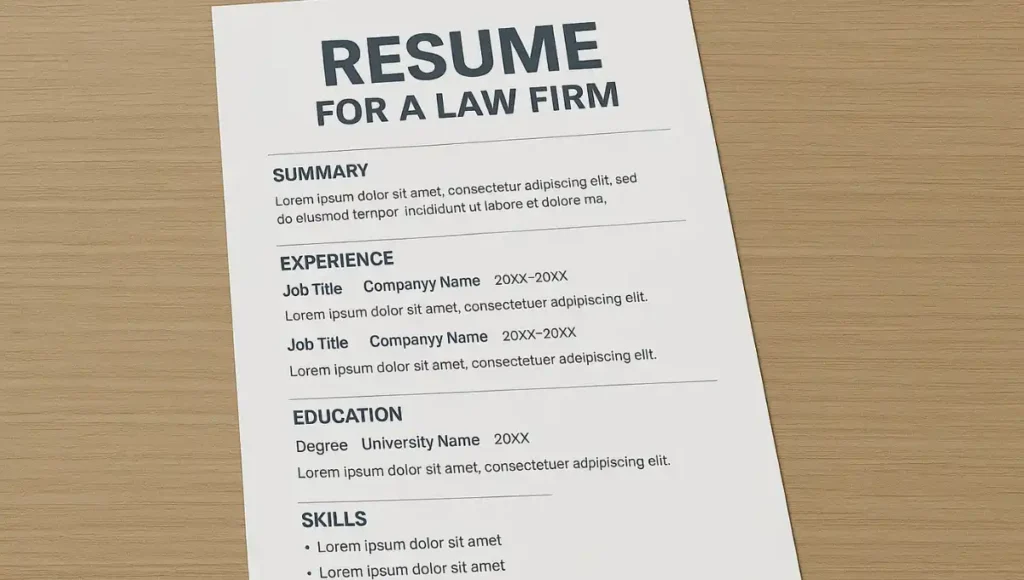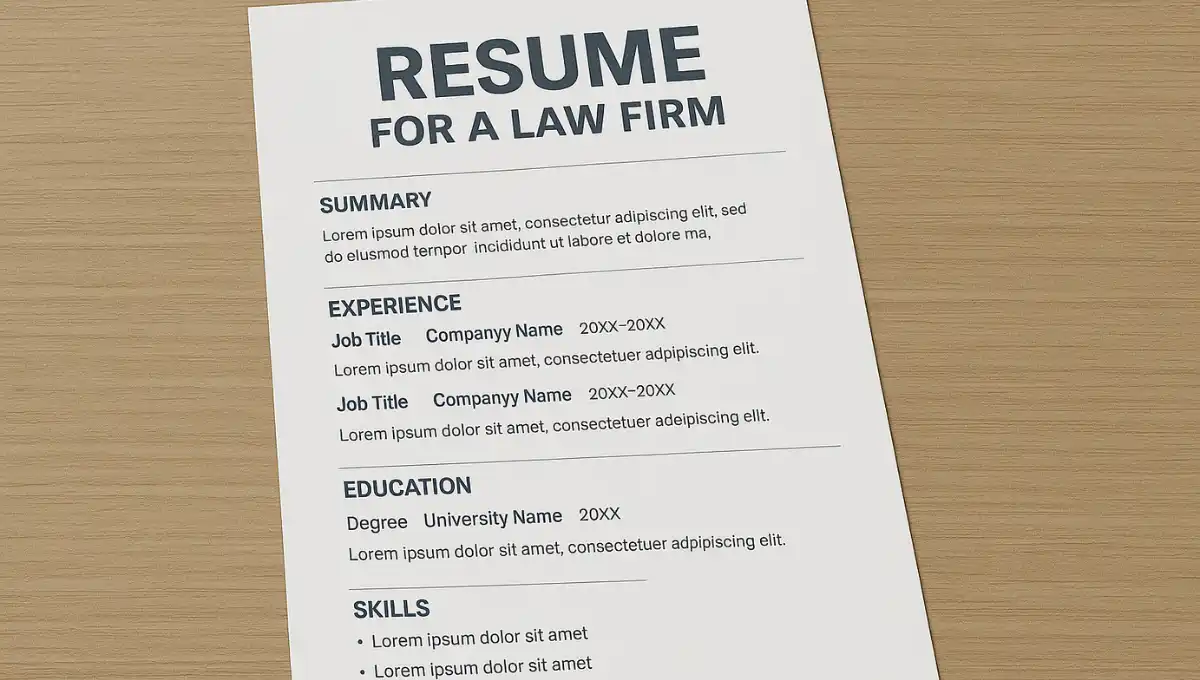Landing a job at a law firm demands more than legal expertise—it requires a resume that speaks directly to hiring managers’ high standards. Law firms sift through hundreds of resumes, seeking candidates who combine precision, professionalism, and a deep understanding of legal nuances.
This guide breaks down the exact steps to create a resume that not only meets but exceeds expectations, ensuring you stand out in this competitive field.

Understanding What Law Firms Look For
Law firms prioritize resumes that reflect attention to detail, clarity, and relevance. Hiring managers spend an average of 7 seconds scanning a resume, so every word must count.
Tailor your resume to emphasize skills like legal research, litigation, client counseling, and case management. Highlighting bar admissions, specialized certifications (e.g., Patent Law or Family Law), and fluency in legal software (Clio, LexisNexis) can further boost your credibility.
Choosing the Right Legal Resume Format
Most law firms prefer the reverse-chronological format, which showcases your most recent experience first. This structure aligns with the legal industry’s emphasis on career progression and hands-on experience. Avoid creative designs and stick to a clean, professional layout.
Start with a header containing your name, contact details, and LinkedIn profile. Follow this with a professional summary: a concise, three-line snapshot of your legal expertise. For example, “Corporate attorney with 5+ years specializing in mergers and acquisitions at top-tier firms.”
Next, detail your experience using action verbs like “negotiated,” “drafted,” or “represented.” Focus on quantifiable achievements, such as “Managed 50+ pro bono cases annually” or “Secured favorable settlements in 90% of contract disputes.”
List your education section with law degrees first, including honors like magna cum laude. Finally, include a skills section that blends hard skills (legal writing, e-discovery) with soft skills (client advocacy, negotiation).
Tailoring Your Resume to the Firm’s Specialty
A generic resume won’t cut it. Research the firm’s practice areas and mirror their language. For instance, corporate law firms value transactional experience, contract drafting, and compliance knowledge. Criminal defense firms prioritize trial experience, plea bargaining, and familiarity with local court procedures.
Incorporate keywords from the job description, such as “litigation support” or “regulatory compliance,” to pass Applicant Tracking Systems (ATS). Avoid jargon, but align your phrasing with terms used in the firm’s online profiles or recent cases.
Highlighting Legal Experience Effectively
Even entry-level candidates can showcase relevant experience. Internships, clinic work, or pro bono cases demonstrate practical skills.
For example, if you assisted with depositions or drafted motions during an internship, specify the outcomes, such as “Contributed to a 30% reduction in case resolution time.”
Pro bono work is especially powerful. Mention client interactions and case results: “Advised 30+ low-income clients on tenant rights at Community Legal Services, achieving 85% favorable outcomes.”
If your background includes non-legal roles, highlight transferable skills. For example, a retail job could demonstrate conflict resolution or client service abilities.
Read more of How to Ace Your Law Firm Internship Interview
Avoiding Common Law Resume Mistakes
Typos or inconsistent formatting can derail an otherwise strong resume. Use tools like Grammarly and ask a mentor to review your draft.
Avoid vague descriptions like “handled cases”—instead, say, “Resolved 12 employment discrimination disputes through mediation.”
Always include bar admissions clearly (e.g., “New York State Bar, Admitted 2020”). Omitting this detail can lead to instant rejection.
Lastly, keep your resume concise: one page for under 10 years of experience; two pages for seasoned attorneys.
FAQs:
Q: Should a law resume include a photo?
No—most U.S. and U.K. firms discourage photos to avoid bias. Focus on content that highlights your qualifications.
Q: How long should my resume be?
Aim for one page if you have fewer than 10 years of experience. Seasoned attorneys with extensive casework or publications may use two pages.
Q: How do I explain a career gap?
Briefly note relevant activities during the gap, such as “Completed Continuing Legal Education courses in Intellectual Property Law” or “Managed family obligations while volunteering with legal aid organizations.”

